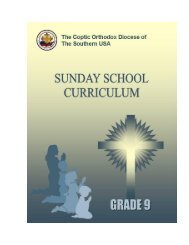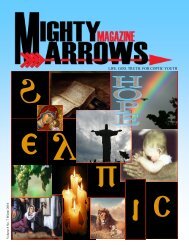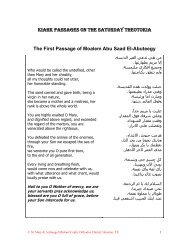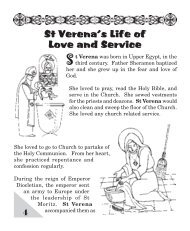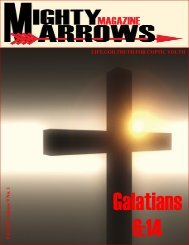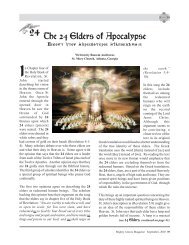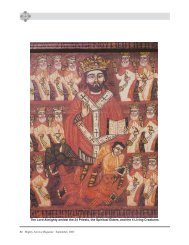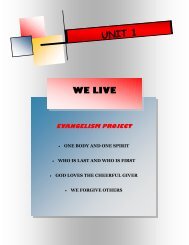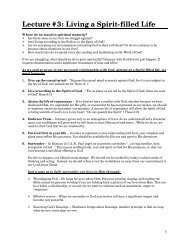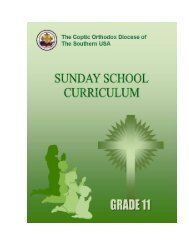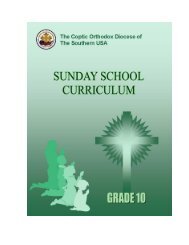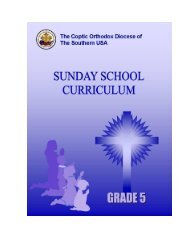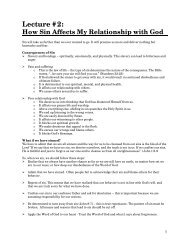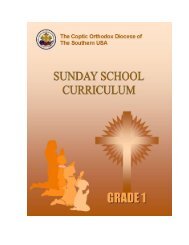Grade 12 - Coptic Orthodox Diocese of the Southern United States
Grade 12 - Coptic Orthodox Diocese of the Southern United States
Grade 12 - Coptic Orthodox Diocese of the Southern United States
You also want an ePaper? Increase the reach of your titles
YUMPU automatically turns print PDFs into web optimized ePapers that Google loves.
Sunday School Curriculum <strong>Grade</strong> <strong>12</strong><br />
Ecclesiastes was a roll that was read at <strong>the</strong> feast <strong>of</strong> Booths. The <strong>the</strong>me <strong>of</strong> <strong>the</strong> book is <strong>the</strong> vanity <strong>of</strong><br />
mere earthly things contrasted to <strong>the</strong> knowledge and service <strong>of</strong> God.<br />
The author <strong>of</strong> this book tells us that he is ―The preacher, <strong>the</strong> son <strong>of</strong> David, King in Jerusalem.‖<br />
This applies to King Solomon where verses (2:4-6) seem to describe him, ―I made my works great, I<br />
build myself houses, and planted myself vineyards. I made myself gardens and orchards, and I<br />
planted all kinds <strong>of</strong> fruit trees in <strong>the</strong>m. I made myself water pools from which to water <strong>the</strong> growing<br />
trees <strong>of</strong> <strong>the</strong> grove.‖<br />
The Book consists <strong>of</strong> <strong>12</strong> chapters containing a series <strong>of</strong> reflections on <strong>the</strong> purpose and nature <strong>of</strong><br />
life, where <strong>the</strong> prevalent sense <strong>of</strong> vanity is attributed to <strong>the</strong> absence <strong>of</strong> God as a purpose <strong>of</strong> our life.<br />
Stated at <strong>the</strong> very beginning <strong>of</strong> <strong>the</strong> work, is ―all is vanity‖ (1:2). Even if you pursue wisdom and<br />
enjoy your wealth, labor faithfully, deplore injustice and wickedness; <strong>the</strong> end is always <strong>the</strong> same,<br />
―vanity and a striving after wind‖ (4:4).<br />
At <strong>the</strong> end verse (<strong>12</strong>:13-14), ―<strong>the</strong> conclusion <strong>of</strong> <strong>the</strong> whole matter: Fear God and keep his<br />
commandments, for this is <strong>the</strong> whole duty <strong>of</strong> man. For God will bring every work into judgment,<br />
including every secret thing, whe<strong>the</strong>r it is good or whe<strong>the</strong>r it is evil‖.<br />
The author praises wisdom as being pr<strong>of</strong>itable: ―Wisdom is good with an inheritance, an<br />
advantage to those who see <strong>the</strong> sun‖ (7:11), yet writes <strong>of</strong> its lack <strong>of</strong> value (1:18). Of life in general, he<br />
supports both extremes by asserting that <strong>the</strong> dead are happier than <strong>the</strong> living and <strong>the</strong> unborn most<br />
fortunate <strong>of</strong> all (4:2-3), but <strong>the</strong>n declares that life is preferable to death: ―Anyone who is among <strong>the</strong><br />
living has hope -- even a live dog is better <strong>of</strong>f than a dead lion‖ (9:4).<br />
One <strong>of</strong> <strong>the</strong> explanations <strong>of</strong> this contradiction is, ―teaching by contrast or contradiction‖. Here <strong>the</strong><br />
author is trying to tell us that life is worthless without a growing faith in God to give a meaning to it.<br />
Ecclesiastes has been called <strong>the</strong> most modern book <strong>of</strong> <strong>the</strong> Bible. Boredom, surfeit, disillusionment,<br />
and world‘s weariness characterize our times as it did in <strong>the</strong> time it was written. Older certainties and<br />
values have crumbled now as in <strong>the</strong> life <strong>of</strong> King Solomon and new purposes to life are sought as <strong>the</strong>n.<br />
It has been also called by Short, ―Ecclesiastes is <strong>the</strong> Bible‘s night before Christmas.‖ Its purpose<br />
seems to be to raise <strong>the</strong> basic question <strong>of</strong> life, which only finds answers in Christ. While he correctly<br />
observes that <strong>the</strong>re is nothing new under <strong>the</strong> sun (1:9) we as Christians affirm that through Christ<br />
<strong>the</strong>re is newness, ―A new commandment I give to you‖ (John <strong>12</strong>:37). ―If anyone is in Christ he is a<br />
new creation‖ (2 Corinthians 5:17). ― Behold, I make all things new‖ (Revelation 21:5).<br />
The unsaved or natural man looks at life and says, ―Death ends it all, eat, drink, and be merry, for<br />
tomorrow we die.‖ This is <strong>the</strong> way <strong>the</strong> unsaved man looks at life, and this is <strong>the</strong> picture that Solomon<br />
gives us in <strong>the</strong> Book <strong>of</strong> Ecclesiastes. In fact, <strong>the</strong> entire Book shows us how <strong>the</strong> unsaved man looks at<br />
life ―under <strong>the</strong> sun‖ (Ecclesiastes 1:14), where this phrase ―under <strong>the</strong> sun‖ appears 29 times. He has<br />
God remote from his human condition.<br />
It is Ecclesiastes‘ sharply critical attitude towards human conduct and <strong>the</strong> instability <strong>of</strong> earthly<br />
existence that has caught <strong>the</strong> attention <strong>of</strong> that great Cappadocian bishop, Gregory <strong>of</strong> Nyssa (c.335-<br />
395), who composed his own commentary on this book. The phrase ―vanity <strong>of</strong> vanities‖ does not<br />
condemn creation but simply our misuse <strong>of</strong> what God had entrusted to our guardianship. As Bishop<br />
Gregory says, <strong>the</strong> outcome <strong>of</strong> our misuse <strong>of</strong> <strong>the</strong> patrimony entrusted to us is <strong>the</strong> illusion that we are<br />
masters <strong>of</strong> ourselves and <strong>of</strong> <strong>the</strong> earth.<br />
When a person begins to grow spiritually, he or she realizes that former ways <strong>of</strong> life and <strong>the</strong> world<br />
view resulting from <strong>the</strong>m no longer suffice for a new manner <strong>of</strong> living which has come to birth. That<br />
THE GREAT FAST <strong>12</strong>5



